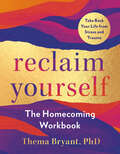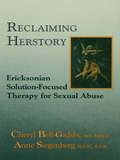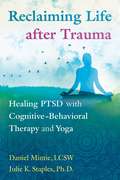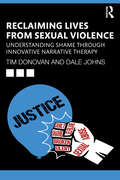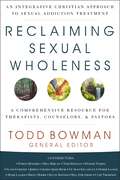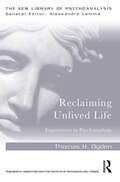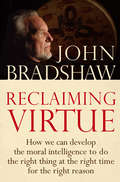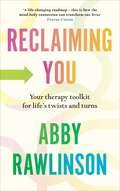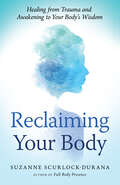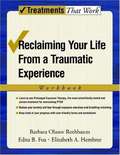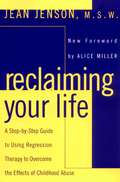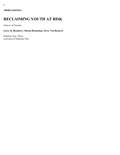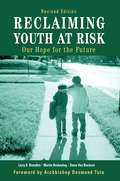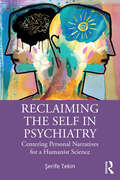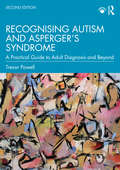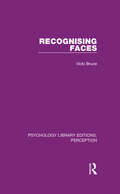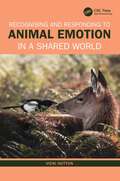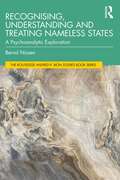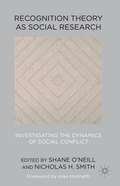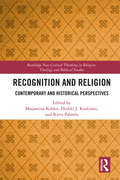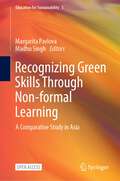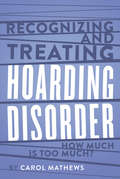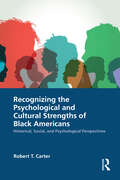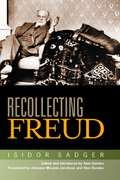- Table View
- List View
Reclaim Yourself: The Homecoming Workbook
by Thema BryantFrom leading mental health expert Dr. Thema Bryant, an accessible resource to process stress and take practical steps toward creating the life you wantTrauma and everyday challenges can cause us to disconnect and fall into survival mode. This comprehensive workbook gently leads us back to our authentic selves by helping us process difficult emotions and identify how ordinary and traumatic stress may have led to harmful patterns, including unhealthy relationships, people-pleasing, control issues, and self-sabotage. Drawing on more than two decades of experience in clinical psychology and trauma recovery, Dr. Thema Bryant guides us through surveys and reflection questions to grow our self-awareness and understanding. She offers a diverse array of psychotherapeutic techniques based in both Western science and indigenous knowledge to help us shift our thoughts, heal our emotions, and actively take steps toward growth. Incorporating journal prompts, grounding exercises, spiritual practices like prayer and meditation, and embodied healing through dance and movement, Reclaim Yourself invites you to process your past, center your present, and transform your future.
Reclaiming Herstory: Ericksonian Solution-Focused Therapy For Sexual Abuse
by Cheryl Bell-Gadsby Anne SiegenbergFirst published in 1996. Routledge is an imprint of Taylor & Francis, an informa company.
Reclaiming Life after Trauma: Healing PTSD with Cognitive-Behavioral Therapy and Yoga
by Daniel Mintie Julie K. StaplesIntegrative tools for healing the traumatized mind and body • Combines cutting-edge Western cognitive-behavioral therapy (CBT) and ancient Eastern wisdom to heal Post-Traumatic Stress Disorder (PTSD) • Teaches Kundalini yoga practices specifically designed to reset parts of the brain and body affected by PTSD • Presents a fast-acting, holistic, evidence-based, and drug-free program for eliminating PTSD symptoms and restoring health, vitality, and joy Trauma, the Greek word for “wound,” is the most common form of suffering in the world today. An inescapable part of living, the bad things that happen to us always leave aftereffects in both body and mind. While many people experience these aftereffects and move on, millions of others develop Post-Traumatic Stress Disorder (PTSD)--a painful, chronic, and debilitating barrier to happiness. Reclaiming Life after Trauma addresses both the physical and psychological expressions of PTSD, presenting an integrative, fast-acting, evidence-based, and drug-free path to recovery. Authors Daniel Mintie, LCSW, and Julie K. Staples, Ph.D., begin with an overview of PTSD and the ways in which it changes our bodies and minds. They present research findings on cognitive-behavioral therapy (CBT) and yoga, giving the reader insights into how these powerful modalities can counteract and reverse the physical and mental aftereffects of trauma. The authors provide a suite of simple, powerful, and easily learned tools readers can put to immediate use to reset their traumatized bodies and minds. On the physical side, they teach four Kundalini yoga techniques that address the hypervigilance, flashbacks, and insomnia characteristic of PTSD. On the psychological side, they present 25 powerful CBT tools that target the self-defeating beliefs, negative emotions, and self-sabotaging behaviors that accompany the disorder. Drawing on many years of clinical work and their experience administering the successful Integrative Trauma Recovery Program, the authors help readers understand PTSD as a mind-body disorder from which we can use our own minds and bodies to recover. Woven throughout the book are inspiring real-life accounts of PTSD recoveries showing how men and women of all ages have used these tools to reclaim their vitality, physical health, peace, and joy.
Reclaiming Lives from Sexual Violence: Understanding Shame through Innovative Narrative Therapy
by Tim Donovan Dale JohnsThis book takes an innovative approach to using narrative therapy in counselling people who have been subject to childhood sexual abuse. Reclaiming Lives from Sexual Violence presents an illustrative case study of the authors, Tim the therapist in consultation with Dale the client, who was sexually abused as a child by a clergy member. The book is unique in documenting their therapeutic work using transcripts taken directly from their sessions together. This narrative approach invites the reader to consider different ways of engaging in therapy in order to challenge the dominant social discourses around masculinity and shame. Looking at shame from a position of value awareness rather than a deficit perspective, this book extends counselling to consider the individual experience as political and one that must be shared outside the one-to-one therapy environment. This will be an essential resource for beginning or established therapists and practitioners working with clients who have been victims of sexual violence.
Reclaiming Sexual Wholeness: An Integrative Christian Approach to Sexual Addiction Treatment
by Todd BowmanA Comprehensive Christian Resource for Treating Sexual Addiction and Problematic Sexual BehaviorAn estimated three to five percent of the U.S. population meet the criteria for sexual addiction, and many more engage in problematic sexual behavior or have been harmed by it. The statistics are startling:77% of Christian men between 18 and 30 watch pornography monthly35% of Christian men have had an extramarital affair1 in 6 boys and 1 in 4 girls have been sexually abusedAmericans spend $13 billion a year on pornography, the regular viewing of which is linked to higher acceptance of violence against women and adversarial sexual beliefs. Therapists and pastors are not always adequately equipped to address the unique demands of competent care for those struggling with sexually addictive behaviors. Reclaiming Sexual Wholeness, edited by Todd Bowman, presents cutting-edge research from a diverse group of experts in a single, comprehensive resource intended for therapists, clergy, and others in helping professions. Contributors include Forest Benedict, Bill Bercaw, Ginger Bercaw, Todd Bowman, Marnie Ferree, Floyd Godfrey, Joshua Grubbs, Josh Hook, Fr. Sean Kilcawley, Debbie Laaser, Mark Laaser, Kevin Skinner, Bill Struthers, and Curt ThompsonReclaiming Sexual Wholeness moves beyond rote cognitive-behavioral approaches and treating sexual addictions solely as lust, adopting a biopsychosocial perspective that incorporates insights from attachment theory and interpersonal neurobiology. The result is a thoroughly faith-integrated, up-to-date resource useful for the classroom, ongoing professional studies, and as a counseling resource.
Reclaiming Unlived Life: Experiences in Psychoanalysis (New Library of Psychoanalysis)
by Thomas OgdenIn Reclaiming Unlived Life, influential psychoanalyst Thomas Ogden uses rich clinical examples to illustrate how different types of thinking may promote or impede analytic work. With a unique style of "creative reading," the book builds upon the work of Winnicott and Bion, discussing the universality of unlived life and the ways unlived life may be reclaimed in the analytic experience. The book examines the role of intuition in analytic practice and the process of developing an analytic style that is uniquely one’s own. Ogden deals with many forms of interplay of truth and psychic change, the transformative effect of conscious and unconscious efforts to confront the truth of experience and how psychoanalysts can understand their own psychic evolution, as well as that of their patients. Reclaiming Unlived Life sets out a new way that analysts can understand and use notions of truth in their clinical work and in their reading of the work of Kafka and Borges. Reclaiming Unlived Life: Experiences in Psychoanalysis will appeal to psychoanalysts and psychoanalytic psychotherapists, as well as postgraduate students and anybody interested in the literature of psychoanalysis.
Reclaiming Virtue: How we can develop the moral intelligence to do the right thing at the right time for the right reason
by John BradshawJohn Bradshaw is one of the bestselling self-help authors of our generation and a dominant figure in the fields of addiction/recovery and family systems. In RECLAIMING VIRTUE, his first new book in more than ten years, Bradshaw takes on a new challenge. He has written a landmark exploration of the life of virtue, how we can develop it in ourselves, and how we can teach it to our children. RECLAIMING VIRTUE redefines what it means to live a moral life in today's world. Coming at a time of heightened debate about public and private morality, a time of greed and lack of caring, he says that the answer is not simply to return to traditional rules-based morality and an idealised past. Instead, he shows that each of us has what he calls an inborn moral intelligence, an inner guidance system, that can lead us - if we know how to cultivate it in ourselves and others. Step by step, Bradshaw shows us how our deepest instincts for goodness can be developed in childhood and nurtured throughout adult life. The result is a compelling vision of good character and moral responsibility for the modern world. Whether the topic is sex, discipline, marriage, the development of conscience or the true aims of education, Bradshaw once again provokes, enlightens and inspires readers everywhere.
Reclaiming You: Your Therapy Toolkit for Life’s Twists and Turns
by Abby Rawlinson'Highlighters at the ready. The therapist we all wish we had delivers a book that you can keep coming back to when life takes a turn' – DR JULIE SMITH, bestselling author of Why Has Nobody Told Me This Before?'A life-changing roadmap on how the mind-body connection can transform our lives' - FEARNE COTTON'With such empathy and wisdom, Abby nudges us back home to ourselves after difficult times' - TASHA BAILEY (@realtalk.therapist)An empowering, practical guide to the tools of therapy you need to know. From integrative therapist, Abby Rawlinson (@therapywithabby), comes this real-world companion to improving your mental health. Guiding you on your journey to reconnecting with your true self, and uncovering the science of how our minds and bodies are interconnected - this empowering handbook shows you how to rediscover what you want and need, break unhealthy patterns and make lasting, positive change.Here are 5 things you'll learn from reading this book that, in turn, will transform your life:1. Have a healthier reaction to stress2. Break your people-pleasing pattern3. Better tackle anxiety and low moods4. Silence your inner critic5. Learn to say 'no' (without feeling guilty)'Warm and personal . . . will help you dig deeper into who you are and help you grow your self belief' - DR MARTHA DEIROS COLLADO (@dr.martha.psychologist)'A must read for anyone wanting to understand themselves a little more deeply.' - HELEN MARIE (@h.e.l.e.n.m.a.r.i.e)
Reclaiming Your Body: Healing from Trauma and Awakening to Your Body’s Wisdom
by Suzanne Scurlock-DuranaA guided tour through the body’s innate healing powersMany of us have learned to ignore, deny, or even mistrust the wise messages our bodies give us. The result is that when trauma strikes, a time when we need every aspect of our beings to master the challenge, we may find ourselves disconnected from our greatest strengths. Suzanne Scurlock-Durana, who has spent thirty years studying the gifts of the body and teaching thousands how to reclaim them, began to recognize this strength, which she likens to a GPS, when she herself experienced a life-threatening trauma. Here she walks readers through different areas of the body, revealing the wisdom they hold and how to reconnect with that wisdom. As she shows in this warm, compassionate book, the body’s abilities are always available; we must simply reconnect with them.
Reclaiming Your Life from a Traumatic Experience
by Edna B. Foa Elizabeth A. Hembree Barbara O. RothbaumIf you've experienced a traumatic event and are having trouble moving past feelings of fear and helplessness, you may be suffering from Posttraumatic Stress Disorder (PTSD). This workbook will help you overcome your PTSD and reclaim your life. <p><p> Best used in combination with treatment by a mental health professional, this workbook will help you work through your PTSD regardless of the type of trauma you've experienced. Whether you have been in a motor vehicle accident, or are a veteran of combat, or have been the victim of a physical or sexual assault, the program outlined in this book will reduce your anxiety and distress. You will learn to face the memories of your trauma, while processing your emotions about the event using a scientifically-tested and proven technique called Prolonged Exposure Therapy (PE). <p> Instead of avoiding or escaping situations that provoke anxiety, you will learn how to confront these situations and begin to reevaluate your feelings and beliefs to think differently about what happened to you. You will participate in exposure exercises where you will face the memories of your trauma, as well as any real-life situations that bring about feelings of fear in a step-by-step controllable way. Breathing retraining exercises will keep you calm and relaxed. As time goes on and you practice these exercises, you will notice a marked decrease in your levels of anxiety. <p> Complete with information on PTSD, as well as case examples, self-assessment tools, and homework assignments, Reclaiming Your Life from a Traumatic Experience , Workbook is an invaluable tool on the road to recovery.
Reclaiming Your Life: A Step-by-Step Guide to Using Regression Therapy to Overcome the Effects of Childhood Abuse
by Alice Miller M. S. W. Jean C. JensonThis book lays out a powerful program for healing the effects of childhood abuse. Provides practical and compassionate guidance on dismantling the childhood defenses of repression and denial in order to access buried experiences and emotions -- and by re-experiencing the pain to finally heal. Using examples from her private practice over the last 14 years, Jenson shows that 12-step and similar programs, as well as traditional therapies, do not fully deal with the phenomenon of repressed pain. Until this pain is "processed"-- retrieved from the unconscious, fully experienced, and grieved over -- she believes adults will be trapped in the patterns of childhood.
Reclaiming Youth At Risk: Futures Of Promise (reach Alienated Youth And Break The Conflict Cycle Using The Circle Of Courage)
by Larry K. Brendtro Martin Brokenleg Steve Van BockernEmpower your alienated students to cultivate a deep sense of belonging, mastery, independence, and generosity. This fully updated edition of Reclaiming Youth at Risk by Larry K. Brendtro, Martin Brokenleg, and Steve Van Bockern merges Native American knowledge and Western science to create a unique alternative for reaching disconnected or troubled youth. Rely on the book's new neuroscience research, insights, and examples to help you establish positive relationships, foster social learning and emotional development, and inspire every young person to thrive and overcome. Drive positive youth development with the updated Reclaiming Youth at Risk: Study the four hazards that dominate the lives of youth at risk: relational trauma, failure as futility, powerlessness, and loss of purpose. Learn how cultivating the Circle of Courage values of belonging, mastery, independence, and generosity can combat the four hazards. Explore a unique strength-based approach for reclaiming discouraged or alienated youth. Understand how to create a safe, brain-friendly learning environment and break the conflict cycle. Read personal accounts of individuals who have transformed student trauma into student resilience in schools through trauma-informed practice.
Reclaiming Youth at Risk: Our Hope for the Future
by Larry K. Brendtro Martin Brokenleg Steven Van BockernA balance of wisdom drawn from Native American philosophies and Western psychology, this book offers a unique perspective for connecting with troubled students. It challenges educators to see youth at risk through new eyes and offers compelling, concrete alternatives for reclaiming them.
Reclaiming the Self in Psychiatry: Centering Personal Narratives for a Humanist Science
by Şerife TekinReclaiming the Self in Psychiatry: Centering Personal Narratives for Humanist Science diagnoses the fundamental problem in contemporary scientific psychiatry to be a lack of a sophisticated and nuanced engagement with the self and proposes a solution—the Multitudinous Self Model (MuSe).MuSe fulfils psychiatry’s twin commitments to patients’ flourishing and scientific objectivity. Marshalling the conceptual and empirical resources from testimonies from individuals diagnosed with mental disorders, substantive research in cognitive science, and empirically informed philosophy, MuSe provides clinicians, scientists, and patients pathways to respond to mental distresses and disorders. This framework boosts psychiatry’s relationship to science by facilitating expansive notions of expertise and objectivity in which some patients are recognized as “experience-based experts” whose contributions to psychiatric knowledge are indispensable. Şerife Tekin draws the contours of a future for psychiatry that is grounded in philosophy, medical humanities, and social sciences as much as physiology and neuroscience.This book is an ideal read for professional psychiatrists and philosophers of psychiatry who are interested in the philosophy of mental health.
Recognising Autism and Asperger’s Syndrome: A Practical Guide to Adult Diagnosis and Beyond
by Trevor PowellRecognising Autism and Asperger’s Syndrome is an accessible guide, offering information and guidance, self-help and coping strategies and illustrated throughout with personal quotes, vignettes and anecdotes from clients with autism with whom the author has worked clinically. The book captures the individual stories, quotations and experiences, observed in adult autism diagnostic services, woven in with contemporary research, theory and clinical insights. It outlines the history of the condition and the present criteria for obtaining a diagnosis. With exercises, tips, questionnaires, psycho-educational work and advice sheets, this new edition also elucidates the female presentation of autism that has attained significance in the recent times. The book is deliberately aimed at a broad audience of people: those who have just received a diagnosis and want to know more, those who are considering seeking a diagnosis, family members, relatives, friends and clinicians, including mental health workers, psychologists, support workers and all those who work with autistic people.
Recognising Faces (Psychology Library Editions: Perception #3)
by Vicki BruceEach of us is able to recognise the faces of many hundreds if not thousands of people known to us. We recognise faces despite seeing them in different views and with changing expressions. From these varying patterns we somehow extract the invariant characteristics of an individual’s face, and usually remember why a face seems familiar, recalling where we know the person from and what they are called. In this book, originally published in 1988, the author describes the progress which has been made by psychologists towards understanding these perceptual and cognitive processes, and points to theoretical directions which may prove important in the future. Though emphasising theory, the book also addresses practical problems of eyewitness testimony, and discusses the relationship between recognising faces, and other aspects of face processing such as perceiving expressions and lipreading. The book was aimed primarily at a research audience, but would also interest advanced undergraduate students in vision and cognition.
Recognising and Responding to Animal Emotion in a Shared World
by Vicki HuttonHow is it that depending on the setting, the same cat can be perceived as a homeless annoyance, a potential research subject or a thinking and feeling family member? The answer is bound up in our perception of non-human animals’ capacity to experience emotions, and this book draws on contemporary evidence-based research, observations, interviews and anecdotal case scenarios to explore the growing knowledge base around animal emotion. Acknowledging that animals can experience feelings directly affects the way that they are perceived and treated in many settings, and the author explores the implications when humans apply – or ignore – this knowledge selectively between species and within species. This information is presented within the unique context of a proposed hierarchy of perceived non-human animals' emotional abilities (often based on human interpretation of the animal’s emotional capacity), with examples of how this manifests at an emotional, spiritual and moral level. Implications for specific groups living with, caring for or working with non-human animals are examined, making the book of particular interest to those working, studying or researching in the veterinary professions; animal ethics, law and welfare; and zoology, biology and animal science. This book will also be fascinating reading for anyone interested in simply learning more about the animals with whom we share this planet. For some readers, it will validate the reciprocal emotional bond they feel for living creatures. For others, it will raise questions about the moral treatment of sentient non-human beings, breaking down the human protective barrier of cognitive dissonance and activating a cycle of change.
Recognising, Understanding and Treating Nameless States: A Psychoanalytic Exploration (The Routledge Wilfred R. Bion Studies Book Series)
by Bernd NissenIn this captivating volume, Bernd Nissen considers the multiplicity of nameless states, and the impact of their discovery on psychoanalytic theory and practice. The nameless is considered through a variety of lenses: trauma, unrepresented states, autistoid/autistic states, breakdown, non-existence, and unrepressed/unstructured consciousness. Nissen draws upon the work of Freud and Bion to inform his exploration of nameless states and the ways in which they might be located, understood and conceptualised. He illuminates the processes of transformation into the psychic and asks how nameless states can be psychically anchored. Clinical vignettes are used throughout to illustrate the consequences for treatment, as well as interpretations of complex holding situations. This book will be of interest to analysts both in practice and in training, as well as psychotherapists and mental health practitioners wishing to understand nameless states more deeply.
Recognition Theory as Social Research
by Nicholas H. Smith Shane O�neillPresents the case for an exciting new research program in the social sciences based on the theory of recognition developed by Axel Honneth and others in recent years. The theory provides a frame for revealing new insights about conflicts and the potential of recognition theory to guide just resolutions of these conflicts is also explored.
Recognition and Religion: Contemporary and Historical Perspectives (Routledge New Critical Thinking in Religion, Theology and Biblical Studies)
by Maijastina Kahlos Heikki J. Koskinen Ritva PalménThis book focuses on recognition and its relation to religion and theology, in both systematic and historical dimensions. While existing research literature on recognition and contemporary recognition theory has been gradually growing since the early 1990s, certain gaps remain in the field covered so far. One of these is the multifaceted interaction between the phenomena of recognition and religion. Since recognition applies to persons, institutions, and normative entities like systems of beliefs, it also provides a very useful analytic and interpretative tool for studying religion. Divided into five sections, with chapters written by established scholars in their respective fields, the book explores the roots, history, and limits of recognition theory in the context of religious belief. Exploring early Christian and medieval sources on recognition and religion, it also offers contemporary applications of this underexplored combination. This is a timely book, as debates over religious identities, problematic forms of extremism and societal issues related with multiculturalism continue to dominate the media and politics. It will, therefore, be of great interest to scholars of recognition studies as well as religious studies, theology, philosophy, and religious and intellectual history.
Recognizing Green Skills Through Non-formal Learning: A Comparative Study in Asia (Education for Sustainability #5)
by Madhu Singh Margarita PavlovaThis open access book looks into the roles and practices of small and micro-enterprises in formal and informal economies across seven countries and one territory in terms of how they contribute to environmental and sustainable development and green skills promotion. By taking into account the perspectives in these four sectors, catering, automotive, waste management and polyvinyl chloride production, this book maps environmental green practices in the region, identifying mechanisms used to assess existing skills (i.e. knowledge, skills and competencies), and evaluating the potential for green skills inclusion in recognition, validation and accreditation.
Recognizing and Treating Hoarding Disorder: How Much Is Too Much?
by Carol MathewsThe first clinical guide to this psychiatric illness, officially recognized by the DSM in 2013. Everybody has heard the statements “she’s a pack rat” or “he’s a hoarder,” but how many of us really know what that means? Pathological hoarding was first formally conceptualized as a syndrome separate from OCD in the early 1990s, yet it wasn’t until 2013 that hoarding received formal psychiatric diagnostic criteria in the DSM. How can a mental health professional who sees clients in an office determine if hoarding is a factor in a client’s life? Here, Carol Mathews provides readers with the first-ever comprehensive clinical book on hoarding, covering every aspect of the disorder. Topics include: epidemiology and impact; screening tools and clinical interview tools for assessment; differential diagnosis and co-occurring disorders; when to suspect mild cognitive impairment and dementia; hoarding behaviors in children; how to differentiate normal keeping of items from hoarding; animal hoarding; the neurobiology of hoarding disorder; treatments, both psychopharmacological and otherwise; self-help options; and the impact of hoarding on the family.
Recognizing the Psychological and Cultural Strengths of Black Americans: Historical, Social and Psychological Perspectives
by Robert T. CarterThis book examines the cultural beliefs and practices of Black folks in relation to psychological strength.Divided into four parts, the book begins with a discussion on the history of African civilizations, including an analysis of faiths, architecture, and cultural diversity of the continent, followed by a meaningful dialogue on the history of slavery and plantations in North America. The later sections are a study on the contribution of the African American community towards America’s prosperity. The book explores cultural values as a source of power, and uses historical, social, and psychological research to construct a framework of Black cultural values and psychological resolve. The author offers practical applications and interventions to demonstrate how this framework can be applied to training and policy matters on both individual and systemic levels.Recognizing the Psychological and Cultural Strengths of Black Americans is essential reading for students and academics in the fields of Psychology, Sociology, Critical Race Theory, Political Science, and other related disciplines. It will also be a useful resource for professionals including policy makers, psychologist, counsellors, educators, and social workers.
Recollecting Freud
by Isidor SadgerAvailable here for the first time in English, this eyewitness account by one of Freuds earliest students has been rediscovered for twenty-first century readers. Isidor Sadgers recollections provide a unique window into the early days of the psychoanalytic movement the internecine and ideological conflicts of Freuds disciples. They also illuminate Freuds own struggles: his delight in wit, his attitudes toward Judaism, and his strong opinions concerning lay, non-medical analysts. As a student, Sadger attended Freuds lectures from 1895 through 1904. Two years later Freud nominated Sadger to his Wednesday Psychological Society (later called the Viennese Psychoanalytic Society). Sadger, however, was not part of Freuds inner circle, but more a participant observer of the early years of the psychoanalytic movement and of Freud as teacher, therapist, and clinician. Sadger was considered one of the most devoted followers of Freud and hoped to become one of Freuds "favorite sons. " At the First Psychoanalytic Congress held in Salzburg in 1908, Sadger was chosen to be one of the principal speakers along with Freud, Jones, Alder, Jung, Prince, Rifkin, Abraham, and Stekel, an honor that bespeaks Sadgers early role in the movement. But Freud and many of his disciples were also openly critical of Sadgers work, calling it at various times overly simplistic, unimaginative, reductionist, orthodox, and rigid. In 1930 Sadger published his memoir, Sigmund Freud: Persönliche Erinnerungen. With the rise of Nazism and World War II, the book became lost to the world of psychoanalytic history. Recently, Alan Dundes learned of its existence and mounted a search that led him around the world to one of the few extant copies in a research library in Japan. The result of his fascinating quest is Recollecting Freud, a long-lost personal account that provides invaluable insights into Freud and his social, cultural, and intellectual context.
Recommended Standards for Delivering High-Quality Care to Veterans with Invisible Wounds
by Carrie M. Farmer Sierra Smucker Natalie Ernecoff Hamad Al-IbrahimThe authors identified ten standards for the delivery of high-quality care for veterans with posttraumatic stress disorder, depression, substance use disorders, and mild traumatic brain injury. They also provide considerations for implementing and disseminating these standards as a first step to improve access to high-quality care for veterans with invisible wounds.
